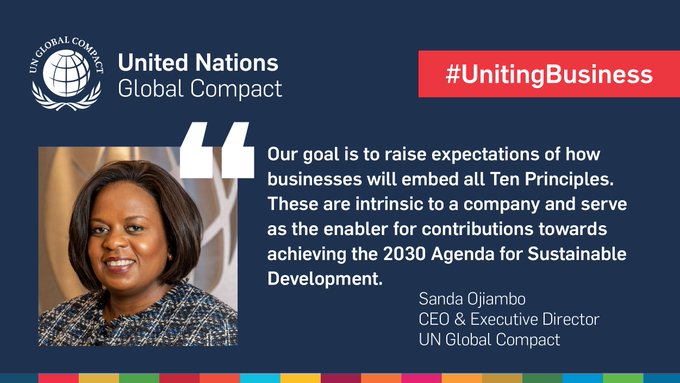The New UN Global Compact Strategy 2021-2023: accelerating business action to achieve the SDGs and more ambitious climate targets
January 19, 2021 – UN Global Compact Board approves new strategy to scale up business ambition and action to achieve the SDGs and Paris Agreement on Climate Change.
UN Secretary-General, António Guterres, Chair of the Board of the UN Global Compact, announced a new three-year strategic plan to increase and accelerate corporate sustainability and principled business.
His words: The United Nations Global Compact is uniquely positioned to support companies on their journey to align their practices to a sustainable and inclusive future. The Ten Principles on Human Rights, Labour, the Environment and Anti-corruption offer a blueprint for businesses seeking to be part of the collective effort to build back stronger from the COVID-19 pandemic.
Now is the time to scale up the global business community’s contributions to the 2030 Agenda and the implementation of the Paris Agreement on climate change. That is the overarching goal of the Global Compact’s strategic plan for 2021 through 2023.
Sanda Ojiambo, CEO & Executive Director, UN Global Compact reiterated this point.
More must be done by businesses globally to accelerate corporate sustainability and responsible business practice. Our strategy and ambition are to grow and take our participants on a journey of demonstrated continuous improvement in the impact that they create, she stated.
With the pandemic and ongoing climate crisis undoing much of the progress the world has achieved since adopting the SDGs in 2015, the new UN Global Compact strategy seeks to galvanize the global business community to increase its contribution to achieving the 2030 Agenda for Sustainable Development and the Paris Agreement.
The strategy outlines five key shifts to boost business action and impact:
- Accountable companies: UN Global Compact will strive to move its participant companies faster and farther than others in demonstrating progress on corporate sustainability and responsible business practices through specific, measurable targets within an enhanced reporting framework.
- Balanced growth of local and regional networks: Local UN Global Compact networks will be empowered to effect change and build more dynamic national ecosystems for business sustainability. This effort should lead to the launch of new national and regional Global Compact networks with a focus on the Global South, China and the U.S.
- Measurable impact in prioritised areas: UN Global Compact programmes, co-created with local networks and delivered through them, focus on the Ten Principles to lead and shape action on five Sustainable Development Goals: Gender Equality (SDG 5), Decent Work and Economic Growth (SDG 8), Climate Action (SDG 13), Peace Justice and Strong Institutions (SDG 16) and Partnerships (SDG 17) while adapting to each country’s unique context.
- Harnessing the collective action of SMEs: Accounting for most of the world’s businesses and employers, UN Global Compact will establish targeted and cross-cutting SME programmes that leverage digital tools and value chains to reach scale.
- Strong and active engagement with the UN and its partners: UN Global Compact will enhance collaboration at the global and national levels with UN agencies and UN country teams to accelerate its reach and its ability to advance responsible business practice globally.
“Our goal is to raise expectations of how businesses will embed all Ten Principles. These are intrinsic to a company and serve as the enabler for contributions towards achieving the 2030 Agenda for Sustainable Development and the Paris Agreement. The five key shifts articulated in this strategy reflect our ambitions for global growth, prioritization, and impact at scale,” Sanda Ojiambo said.
“Together, we will be One Global Compact uniting business for a better world.”

